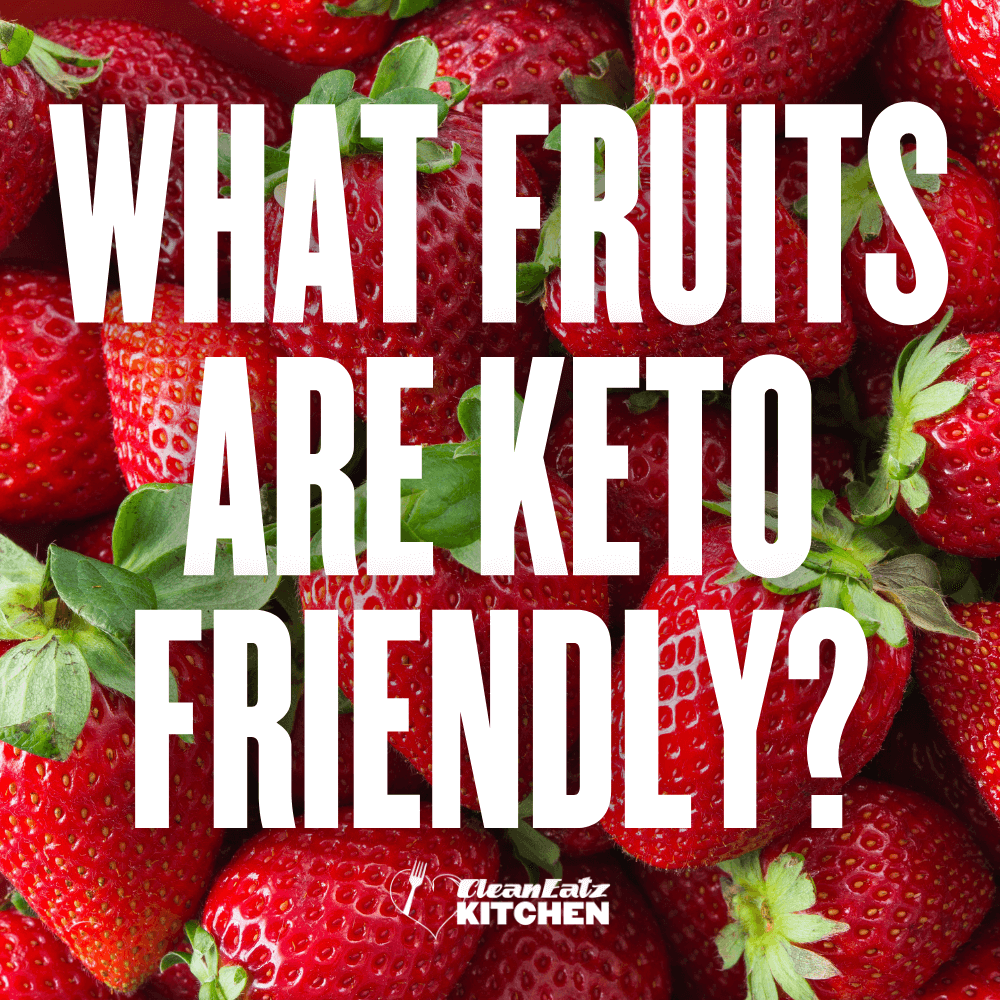
What Fruits are Keto-Friendly?
Diana Ketchen
Nutrition
|
Weight Loss
8 minute read
The ketogenic, or keto, diet is an extremely low-carb, high-fat way of eating in which daily carbohydrate intake is frequently kept to under 20 to 50 grams. As a result, many high-carb items, such as some varieties of grains, starchy vegetables, legumes, and fruits, aren't allowed on this diet. However, some fruits are lower in carbohydrates and can be incorporated into a balanced diet you can obtain from a keto meal delivery service. Some have a lot of fiber, an indigestible carbohydrate that doesn't count against your daily intake. So, if you're wondering what are keto friendly fruits, look for those that are lower in carbohydrates and higher in fiber, making them great keto-friendly fruits.
You may be curious about keto-friendly fruits. If so, here are the top 8 keto-friendly fruits that you can try incorporating into your diet:
-
Strawberries
Keto-friendly fruits are sweet, nourishing, and loaded with health advantages. They make a great addition to a low-carb or ketogenic diet since they are high in fiber and low in carbohydrates. This fruit only contains 11.7 grams of carbohydrates and 3 grams of fiber per 1-cup (152-gram) meal. Keto-friendly fruits are also a great source of micronutrients like folate, manganese, and vitamin C and are rich in antioxidants such as anthocyanins, ellagic acid, and procyanidins.
-
Lemons
Lemons are a common citrus fruit used to flavor many different dishes, desserts, and beverages. Since each lemon contains about 5.5 grams of carbohydrates and 1.5 grams of nutritional fiber, they can be an excellent addition to the keto friendly fruits diet.
Pectin, a type of fiber that can help regulate blood sugar levels, fight inflammation, and inhibit the formation of cancer cells, is particularly abundant in lemons. They also include vitamin C, potassium, and vitamin B6.
-
Watermelon
Watermelon is a tasty and refreshing keto friendly fruit that is simple to include in a ketogenic diet. Keto friendly fruits have a relatively low net carb count compared to other fruits, with 11.5 grams of carbohydrates and 0.5 grams of fiber in a 1-cup (152-gram) serving. Nevertheless, you might need to change your portion sizes to include keto friendly fruits in your diet, depending on how many carbohydrates you are allowed daily.
Keto friendly fruits are full of many vitamins and minerals, including vitamin C, potassium, and copper. Additionally, watermelon, one of the keto friendly fruits, has lycopene, a plant element that works as an antioxidant to reduce cell damage and fend off disease.
-
Avocado
Although avocados are frequently referred to as vegetables, they belong to the category of keto friendly fruits. Avocados are a fantastic addition to a ketogenic diet because of their high quantity of heart-healthy fats. Additionally, a 3.5-ounce (100-gram) portion has only 8.5 grams of net carbohydrates and almost 7 grams of fiber. A variety of additional essential elements, such as vitamin K, folate, vitamin C, and potassium, are also present in keto friendly fruits like avocados.
-
Tomatoes
Despite frequently being used as a vegetable in recipes, Tomatoes are categorized as a fruit. Tomatoes are a simple food to incorporate into a healthy ketogenic diet because they are among the keto friendly fruits, with a substantially lower carb count than many other fruits.
Around 7 grams of carbohydrates and 2 grams of fiber can be found in one cup (180 grams) of raw tomatoes. Tomatoes are high in lycopene, beta-carotene, and naringenin while being low in calories. So, if you are wondering what fruits are keto friendly, tomatoes are a great choice.
-
Peaches
Peaches are a type of keto-friendly fruit distinguished by their fuzzy skin and sweet, juicy flesh. They have a reasonably low net carbohydrate count, with 14.7 grams of carbohydrates and 2.5 grams of fiber per cup (154 grams). Keto-friendly fruits like peaches can be incorporated into a nutritious keto diet by controlling your portion size and eating them alongside other low-carb meals. They are also abundant in other critical micronutrients like niacin, potassium, vitamin C, and vitamin A.
Eating keto-friendly fruits like peaches regularly, along with other fruits and vegetables rich in flavonoids and stilbene, may even be associated with improved triglyceride and cholesterol levels, all of which are risk factors for heart disease.
-
Raspberries
Raspberries are not only among the healthiest keto-friendly fruits but also a fantastic addition to a low-carb or ketogenic diet. One cup (123 grams) of raspberries comprises about 15 grams of carbohydrates and 8 grams of fiber; therefore, it only has 7 grams of net carbohydrates. Additionally, each meal provides healthy amounts of copper, manganese, vitamin K, and vitamin C. Furthermore, keto-friendly fruits like raspberries contain a lot of antioxidants that can reduce inflammation and lower your chance of developing chronic diseases.
-
Cantaloupe
A variety of muskmelon known as the cantaloupe is linked to other melon species, including watermelon and honeydew. Cantaloupe has only 12.7 grams of net carbohydrates and 1.5 grams of fiber per cup (156 grams), making it one of the keto-friendly fruits with comparatively low-carb content. Only one serving supplies a substantial amount of folate, potassium, and vitamin K. Furthermore, it is among the richest suppliers of beta carotene, a type of plant pigment essential for the immune system and eye health.
Although fruits are frequently excluded from the ketogenic diet, many keto-friendly fruits can be consumed in moderation. Many of these fruits provide a multitude of other essential vitamins, minerals, and antioxidants that support general health, in addition to being low in net carbohydrates and high in fiber. As part of a balanced ketogenic diet, enjoy these keto-friendly fruits in moderation along with a range of other low-carb items.
Following a keto diet, similar to other weight loss meal delivery diets, is an excellent way to enhance your eating habits and shed excess weight. Clean Eatz Kitchen offers a wide variety of ketogenic meal delivery plans that consist of both nutritious and delicious keto-friendly fruits. Clean Eatz prepares your meals ahead of time, so you don't have to worry about it. This saves you significant time and ensures you always have keto-friendly fruits on hand when you need them. Sticking to your meal plan has never been easier! Visit our website to learn more about Clean Eatz Kitchen and what fruits are keto-friendly. We are here to help you!
Conclusion
In conclusion, the ketogenic diet provides an effective approach to eating by focusing on low-carb, high-fat foods. While some fruits are restricted due to their higher carb content, there are several keto-friendly fruits that can be enjoyed in moderation. Incorporating fruits like strawberries, lemons, watermelon, avocados, tomatoes, peaches, raspberries, and cantaloupe into your diet provides not only a delicious variety but also essential vitamins, minerals, and antioxidants for overall health. Clean Eatz Kitchen offers convenient and nutritious meal delivery plans, ensuring you have access to these keto-friendly fruits and more while sticking to your diet goals. Achieve a healthier lifestyle with Clean Eatz Kitchen!
FAQ
What fruit can you eat during keto?
During keto, you can enjoy low-carb fruits such as berries (strawberries, raspberries, blackberries), avocados, lemons, and tomatoes. These fruits are relatively low in net carbs and high in fiber, making them suitable choices for a ketogenic diet.
What fruits to avoid on keto?
On a keto diet, it's essential to avoid fruits with high carbohydrate content, as they can disrupt the state of ketosis. Some fruits to avoid include:
- Bananas: High in carbs and sugars.
- Grapes: Contain natural sugars that can add up quickly.
- Apples: Relatively high in carbs, especially when consumed whole.
- Oranges: Rich in natural sugars and carbs.
- Mangoes: High in sugars and carbohydrates.
- Pineapples: High in sugar and not keto-friendly.
- Cherries: Contain significant amounts of carbs and sugars.
- Pears: Relatively high in carbs compared to other fruits.
While these fruits may be nutritious, they can hinder ketosis and should be limited or avoided while following a keto diet. Instead, opt for keto-friendly fruits with lower carbohydrate content and higher fiber.
What foods to stop on keto?
On a keto diet, it's crucial to avoid or limit certain foods that are high in carbohydrates and sugars. Here are some foods to stop or minimize:
- Grains: Wheat, rice, oats, and other grains are high in carbs and should be avoided.
- Sugary Foods: Candy, cookies, cakes, and sugary beverages should be eliminated due to their high sugar content.
- Starchy Vegetables: Potatoes, sweet potatoes, and corn are rich in carbs and should be limited.
- Legumes: Beans, lentils, and peas are high in carbohydrates and best avoided.
- Fruits High in Carbs: Avoid high-carb fruits like bananas, grapes, and mangos.
- Processed Foods: Many processed foods contain hidden sugars and carbs, so it's best to avoid them.
- Alcohol: Alcoholic beverages can be high in carbohydrates and may hinder ketosis.
- Sugary Condiments: Watch out for ketchup, BBQ sauce, and other condiments high in sugar.
Instead, focus on consuming foods that are low in carbohydrates and high in healthy fats and proteins, such as meats, fish, eggs, nuts, seeds, avocados, and non-starchy vegetables. Following a well-balanced and mindful keto diet will help you achieve your health and weight loss goals.
Related Articles
Top 10 Healthy Lunch Ideas for Weight Loss
9 minute read
What Is The Best Weight Loss Program?
7 minute read
How Effective Is Wellbutrin For Weight Loss?
5 minute read



